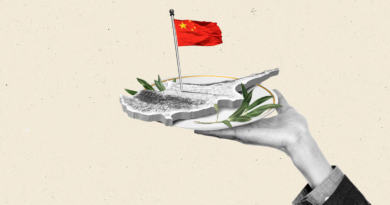Explaining ‘Surveillance Capitalism’: You are the product
As our societies continue through this radical shift into a fully digitalized world, it is becoming more evident that the personal information of the individual is the prime commodity of the ruling tech companies.
The idea of ‘Surveillance Capitalism’ came about in 2001 as Google sought to find an alternative solution in light of the dot-com crash. The tech giant used its significant data on its users, although incomparable to what it holds today, combined with its analytical prowess to predict click-through rates and thus better measure the accuracy of an advert.
This paved the way for what has morphed into the new form of capitalism in the digital age, where the individual’s processes and actions are used by tech giants to profit from our habits which are in part engineered by the very same companies.
But this has gone from mere advertising to the full-scale prediction of human behavior, becoming the default profit-driven business model of all startups and tech companies since.
Author Shoshana Zuboff provides a good case for the concept of the individual being the currency of the digital age in her book named ‘The Age of Surveillance Capitalism’.
“Surveillance capitalism unilaterally claims human experience as free raw material for translation into behavioural data,” Zuboff tells John Naughton of the Guardian.
“Although some of these data are applied to service improvement, the rest are declared as a proprietary behavioural surplus, fed into advanced manufacturing processes known as ‘machine intelligence’, and fabricated into prediction products that anticipate what you will do now, soon, and later.
“Finally, these prediction products are traded in a new kind of marketplace that I call behavioural futures markets. Surveillance capitalists have grown immensely wealthy from these trading operations, for many companies are willing to lay bets on our future behaviour.”
Naughton then proceeded to ask 10 questions to Zuboff for her view on several aspects of surveillance capitalism and what its future implications are.
JN: At the moment, the world is obsessed with Facebook. But as you tell it, Google was the prime mover.
SZ: Surveillance capitalism is a human creation. It lives in history, not in technological inevitability. It was pioneered and elaborated through trial and error at Google in much the same way that the Ford Motor Company discovered the new economics of mass production or General Motors discovered the logic of managerial capitalism.
Surveillance capitalism was invented around 2001 as the solution to financial emergency in the teeth of the dotcom bust when the fledgling company faced the loss of investor confidence. As investor pressure mounted, Google’s leaders abandoned their declared antipathy toward advertising. Instead they decided to boost ad revenue by using their exclusive access to user data logs (once known as “data exhaust”) in combination with their already substantial analytical capabilities and computational power, to generate predictions of user click-through rates, taken as a signal of an ad’s relevance.
Operationally this meant that Google would both repurpose its growing cache of behavioural data, now put to work as a behavioural data surplus, and develop methods to aggressively seek new sources of this surplus.
The company developed new methods of secret surplus capture that could uncover data that users intentionally opted to keep private, as well as to infer extensive personal information that users did not or would not provide. And this surplus would then be analysed for hidden meanings that could predict click-through behaviour. The surplus data became the basis for new predictions markets called targeted advertising.
Here was the origin of surveillance capitalism in an unprecedented and lucrative brew: behavioural surplus, data science, material infrastructure, computational power, algorithmic systems, and automated platforms. As click-through rates skyrocketed, advertising quickly became as important as search. Eventually it became the cornerstone of a new kind of commerce that depended upon online surveillance at scale.
The success of these new mechanisms only became visible when Google went public in 2004. That’s when it finally revealed that between 2001 and its 2004 IPO, revenues increased by 3,590 percent.
JN: So surveillance capitalism started with advertising, but then became more general?
SZ: Surveillance capitalism is no more limited to advertising than mass production was limited to the fabrication of the Ford Model T. It quickly became the default model for capital accumulation in Silicon Valley, embraced by nearly every startup and app. And it was a Google executive – Sheryl Sandberg – who played the role of Typhoid Mary, bringing surveillance capitalism from Google to Facebook, when she signed on as Mark Zuckerberg’s number two in 2008. By now it’s no longer restricted to individual companies or even to the internet sector. It has spread across a wide range of products, services, and economic sectors, including insurance, retail, healthcare, finance, entertainment, education, transportation, and more, birthing whole new ecosystems of suppliers, producers, customers, market-makers, and market players. Nearly every product or service that begins with the word “smart” or “personalised”, every internet-enabled device, every “digital assistant”, is simply a supply-chain interface for the unobstructed flow of behavioural data on its way to predicting our futures in a surveillance economy.
JN: In this story of conquest and appropriation, the term “digital natives” takes on a new meaning…
SZ: Yes, “digital natives” is a tragically ironic phrase. I am fascinated by the structure of colonial conquest, especially the first Spaniards who stumbled into the Caribbean islands. Historians call it the “conquest pattern”, which unfolds in three phases: legalistic measures to provide the invasion with a gloss of justification, a declaration of territorial claims, and the founding of a town to legitimate the declaration. Back then Columbus simply declared the islands as the territory of the Spanish monarchy and the pope.
The sailors could not have imagined that they were writing the first draft of a pattern that would echo across space and time to a digital 21st century. The first surveillance capitalists also conquered by declaration. They simply declared our private experience to be theirs for the taking, for translation into data for their private ownership and their proprietary knowledge. They relied on misdirection and rhetorical camouflage, with secret declarations that we could neither understand nor contest.
Google began by unilaterally declaring that the world wide web was its to take for its search engine. Surveillance capitalism originated in a second declaration that claimed our private experience for its revenues that flow from telling and selling our fortunes to other businesses. In both cases, it took without asking. Page [Larry, Google co-founder] foresaw that surplus operations would move beyond the online milieu to the real world, where data on human experience would be free for the taking. As it turns out his vision perfectly reflected the history of capitalism, marked by taking things that live outside the market sphere and declaring their new life as market commodities.
We were caught off guard by surveillance capitalism because there was no way that we could have imagined its action, any more than the early peoples of the Caribbean could have foreseen the rivers of blood that would flow from their hospitality toward the sailors who appeared out of thin air waving the banner of the Spanish monarchs. Like the Caribbean people, we faced something truly unprecedented.
“Once we searched Google, but now Google searches us. Once we thought of digital services as free, but now surveillance capitalists think of us as free.”
JN: Then there’s the “inevitability” narrative – technological determinism on steroids.
SZ: In my early fieldwork in the computerising offices and factories of the late 1970s and 80s, I discovered the duality of information technology: its capacity to automate but also to “informate”, which I use to mean to translate things, processes, behaviours, and so forth into information. This duality set information technology apart from earlier generations of technology: information technology produces new knowledge territories by virtue of its informating capability, always turning the world into information. The result is that these new knowledge territories become the subject of political conflict. The first conflict is over the distribution of knowledge: “Who knows?” The second is about authority: “Who decides who knows?” The third is about power: “Who decides who decides who knows?”
Now the same dilemmas of knowledge, authority and power have surged over the walls of our offices, shops and factories to flood each one of us… and our societies. Surveillance capitalists were the first movers in this new world. They declared their right to know, to decide who knows, and to decide who decides. In this way they have come to dominate what I call “the division of learning in society”, which is now the central organising principle of the 21st-century social order, just as the division of labour was the key organising principle of society in the industrial age.
JN: So the big story is not really the technology per se but the fact that it has spawned a new variant of capitalism that is enabled by the technology?
SZ: Larry Page grasped that human experience could be Google’s virgin wood, that it could be extracted at no extra cost online and at very low cost out in the real world. For today’s owners of surveillance capital the experiential realities of bodies, thoughts and feelings are as virgin and blameless as nature’s once-plentiful meadows, rivers, oceans and forests before they fell to the market dynamic. We have no formal control over these processes because we are not essential to the new market action. Instead we are exiles from our own behaviour, denied access to or control over knowledge derived from its dispossession by others for others. Knowledge, authority and power rest with surveillance capital, for which we are merely “human natural resources”. We are the native peoples now whose claims to self-determination have vanished from the maps of our own experience.
While it is impossible to imagine surveillance capitalism without the digital, it is easy to imagine the digital without surveillance capitalism. The point cannot be emphasised enough: surveillance capitalism is not technology. Digital technologies can take many forms and have many effects, depending upon the social and economic logics that bring them to life. Surveillance capitalism relies on algorithms and sensors, machine intelligence and platforms, but it is not the same as any of those.
JN: Where does surveillance capitalism go from here?
SZ: Surveillance capitalism moves from a focus on individual users to a focus on populations, like cities, and eventually on society as a whole. Think of the capital that can be attracted to futures markets in which population predictions evolve to approximate certainty.
This has been a learning curve for surveillance capitalists, driven by competition over prediction products. First they learned that the more surplus the better the prediction, which led to economies of scale in supply efforts. Then they learned that the more varied the surplus the higher its predictive value. This new drive toward economies of scope sent them from the desktop to mobile, out into the world: your drive, run, shopping, search for a parking space, your blood and face, and always… location, location, location.
The evolution did not stop there. Ultimately they understood that the most predictive behavioural data comes from what I call “economies of action”, as systems are designed to intervene in the state of play and actually modify behaviour, shaping it toward desired commercial outcomes. We saw the experimental development of this new “means of behavioural modification” in Facebook’s contagion experiments and the Google-incubated augmented reality game Pokémon Go.
Democracy has slept, while surveillance capitalists amassed unprecedented concentrations of knowledge and power
Shoshana Zuboff
It is no longer enough to automate information flows about us; the goal now is to automate us. These processes are meticulously designed to produce ignorance by circumventing individual awareness and thus eliminate any possibility of self-determination. As one data scientist explained to me, “We can engineer the context around a particular behaviour and force change that way… We are learning how to write the music, and then we let the music make them dance.”
This power to shape behaviour for others’ profit or power is entirely self-authorising. It has no foundation in democratic or moral legitimacy, as it usurps decision rights and erodes the processes of individual autonomy that are essential to the function of a democratic society. The message here is simple: Once I was mine. Now I am theirs.
JN: What are the implications for democracy?
SZ: During the past two decades surveillance capitalists have had a pretty free run, with hardly any interference from laws and regulations. Democracy has slept while surveillance capitalists amassed unprecedented concentrations of knowledge and power. These dangerous asymmetries are institutionalised in their monopolies of data science, their dominance of machine intelligence, which is surveillance capitalism’s “means of production”, their ecosystems of suppliers and customers, their lucrative prediction markets, their ability to shape the behaviour of individuals and populations, their ownership and control of our channels for social participation, and their vast capital reserves. We enter the 21st century marked by this stark inequality in the division of learning: they know more about us than we know about ourselves or than we know about them. These new forms of social inequality are inherently antidemocratic.
At the same time, surveillance capitalism diverges from the history of market capitalism in key ways, and this has inhibited democracy’s normal response mechanisms. One of these is that surveillance capitalism abandons the organic reciprocities with people that in the past have helped to embed capitalism in society and tether it, however imperfectly, to society’s interests. First, surveillance capitalists no longer rely on people as consumers. Instead, supply and demand orients the surveillance capitalist firm to businesses intent on anticipating the behaviour of populations, groups and individuals. Second, by historical standards the large surveillance capitalists employ relatively few people compared with their unprecedented computational resources. General Motors employed more people during the height of the Great Depression than either Google or Facebook employs at their heights of market capitalisation. Finally, surveillance capitalism depends upon undermining individual self-determination, autonomy and decision rights for the sake of an unobstructed flow of behavioural data to feed markets that are about us but not for us.
This antidemocratic and anti-egalitarian juggernaut is best described as a market-driven coup from above: an overthrow of the people concealed as the technological Trojan horse of digital technology. On the strength of its annexation of human experience, this coup achieves exclusive concentrations of knowledge and power that sustain privileged influence over the division of learning in society. It is a form of tyranny that feeds on people but is not of the people. Paradoxically, this coup is celebrated as “personalisation”, although it defiles, ignores, overrides, and displaces everything about you and me that is personal.
JN: Our societies seem transfixed by all this: we are like rabbits paralysed in the headlights of an oncoming car.
SZ: Despite surveillance capitalism’s domination of the digital milieu and its illegitimate power to take private experience and to shape human behaviour, most people find it difficult to withdraw, and many ponder if it is even possible. This does not mean, however, that we are foolish, lazy, or hapless. On the contrary, in my book I explore numerous reasons that explain how surveillance capitalists got away with creating the strategies that keep us paralysed. These include the historical, political and economic conditions that allowed them to succeed. And we’ve already discussed some of the other key reasons, including the nature of the unprecedented, conquest by declaration. Other significant reasons are the need for inclusion, identification with tech leaders and their projects, social persuasion dynamics, and a sense of inevitability, helplessness and resignation.
We are trapped in an involuntary merger of personal necessity and economic extraction, as the same channels that we rely upon for daily logistics, social interaction, work, education, healthcare, access to products and services, and much more, now double as supply chain operations for surveillance capitalism’s surplus flows. The result is that the choice mechanisms we have traditionally associated with the private realm are eroded or vitiated. There can be no exit from processes that are intentionally designed to bypass individual awareness and produce ignorance, especially when these are the very same processes upon which we must depend for effective daily life. So our participation is best explained in terms of necessity, dependency, the foreclosure of alternatives, and enforced ignorance.
JN: Doesn’t all this mean that regulation that just focuses on the technology is misguided and doomed to fail? What should we be doing to get a grip on this before it’s too late?
SZ: The tech leaders desperately want us to believe that technology is the inevitable force here, and their hands are tied. But there is a rich history of digital applications before surveillance capitalism that really were empowering and consistent with democratic values. Technology is the puppet, but surveillance capitalism is the puppet master.
Surveillance capitalism is a human-made phenomenon and it is in the realm of politics that it must be confronted. The resources of our democratic institutions must be mobilised, including our elected officials. GDPR [a recent EU law on data protection and privacy for all individuals within the EU] is a good start, and time will tell if we can build on that sufficiently to help found and enforce a new paradigm of information capitalism. Our societies have tamed the dangerous excesses of raw capitalism before, and we must do it again.
While there is no simple five-year action plan, much as we yearn for that, there are some things we know. Despite existing economic, legal and collective-action models such as antitrust, privacy laws and trade unions, surveillance capitalism has had a relatively unimpeded two decades to root and flourish. We need new paradigms born of a close understanding of surveillance capitalism’s economic imperatives and foundational mechanisms.”
For example, the idea of “data ownership” is often championed as a solution. But what is the point of owning data that should not exist in the first place? All that does is further institutionalise and legitimate data capture. It’s like negotiating how many hours a day a seven-year-old should be allowed to work, rather than contesting the fundamental legitimacy of child labour. Data ownership also fails to reckon with the realities of behavioural surplus. Surveillance capitalists extract predictive value from the exclamation points in your post, not merely the content of what you write, or from how you walk and not merely where you walk. Users might get “ownership” of the data that they give to surveillance capitalists in the first place, but they will not get ownership of the surplus or the predictions gleaned from it – not without new legal concepts built on an understanding of these operations.
Another example: there may be sound antitrust reasons to break up the largest tech firms, but this alone will not eliminate surveillance capitalism. Instead it will produce smaller surveillance capitalist firms and open the field for more surveillance capitalist competitors.
So what is to be done? In any confrontation with the unprecedented, the first work begins with naming. Speaking for myself, this is why I’ve devoted the past seven years to this work… to move forward the project of naming as the first necessary step toward taming. My hope is that careful naming will give us all a better understanding of the true nature of this rogue mutation of capitalism and contribute to a sea change in public opinion, most of all among the young.




